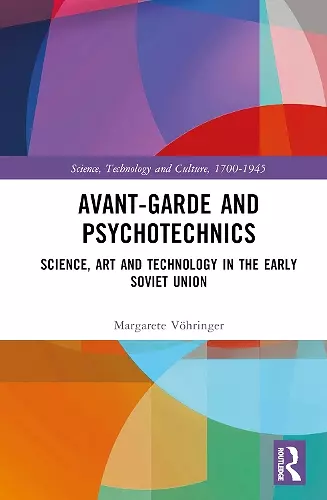Avant-Garde and Psychotechnics
Science, Art and Technology in the Early Soviet Union
Format:Hardback
Publisher:Taylor & Francis Ltd
Published:31st Jul '23
Should be back in stock very soon
This hardback is available in another edition too:
- Paperback£39.99was £39.99(9781032532677)

Avant-Garde and Psychotechnics presents an innovative look at the Russian avant-garde and its cultural encounters with the sciences in the 1920s. The book examines some of the lesser known entanglements between architects, filmmakers and philosophers, on the one hand, and experimental psychologists and physiologists on the other. In Russia, famous avant-garde artists, such as El Lissitzky, Vassily Kandinsky and Dziga Vertov, helped propagate a movement referred to as "psychotechnics" that was emerging at the time in Germany and the United States and eventually led to a "psychotechnical boom." At the end of the story told in the book, it becomes clear that this boom continues to the present day. By analyzing concrete projects undertaken by Russian artists and scientists in cooperation with one another, and by drawing on as-yet-unpublished archival material, Avant-Garde and Psychotechnics challenges the established notion of socialist sciences. At the same time, it provides an entirely new picture of what was thought to be modern art, thereby demonstrating that artistic experimentation had much more than a mere metaphorical meaning in Russian arts in the 1920s.
In 2007 Avant-Garde and Psychotechnics was acknowledged with an award for interdisciplinary research by the Wilhelm-Ostwald-Society, Großbothen. In 2011 the book received funding from the VolkswagenStiftung to be translated into English and Russian (the Russian edition was published by NLO books in 2019). The original German edition also received favorable reviews in NZZ, NTM, Derive, Junge Welt and Sehepunkte.
Much has been written on the relations between the arts and sciences. Margarete Vöhringer's ambitious book goes further and explores ways, at a particular time and place, in which there were not separable ‘related’ activities but a common experimental practice with material things, in which all was ‘art’. The purpose is not to dissolve differences but to specify, in historical detail, the sharing and modification of material practices and instrumentation as they carry from one cultural setting to another.
Roger Smith, The British Journal for the History of Science, 2023:1-2
ISBN: 9781032532646
Dimensions: unknown
Weight: 496g
240 pages